He Built a Community of Runners. One Athlete Donated a Kidney in Return.
This article originally appeared on Outside
At the start line of the Falmouth Road Race in August, a smattering of languages cuts through an otherwise monolingual field. A hum of nervous chatter blends with the rhythm of the Atlantic Ocean, drumming the Cape Cod shore. Then, Spanish, and lots of it.
Thirty runners stand at the ready, clad in black singlets with red equal signs across their chests. These athletes are all part of Stride for Stride, a nonprofit running organization composed mostly of immigrants. A few wrap their arms around each other. Some laugh. Others shake out their legs. While any onlooker might notice camaraderie in this crew, they won't understand the full extent of these runners' bonds. Many Stride for Stride athletes would do anything for each other. In some cases, they'd even give a kidney.
The Beginning of a Dream
Stride for Stride was founded by Tom O'Keefe, not an immigrant himself but, rather, a 50-year-old social impact entrepreneur with a background in business development, known for his viral Twitter account, BostonTweet. O'Keefe started BostonTweet to uplift local businesses during the 2008 recession. Such was the mindset with which he proceeded to co-found Flutter in 2015--an organization that empowered folks to donate to local charities--and launch various other social impact projects.
O’Keefe also brought this mindset to his first starting line. Upon completing the seven-mile Falmouth Road Race in 2018, O'Keefe was struck by the feeling of invincibility that comes after pushing one's body across the finish. But alongside glee was a less positive feeling, a disappointment of the high registration cost, and the race participants' overwhelming whiteness. He sought to make road races more diverse and accessible. Later that year, he launched Stride for Stride, with the goal to buy race bibs for immigrant, BIPOC, and low-income runners.
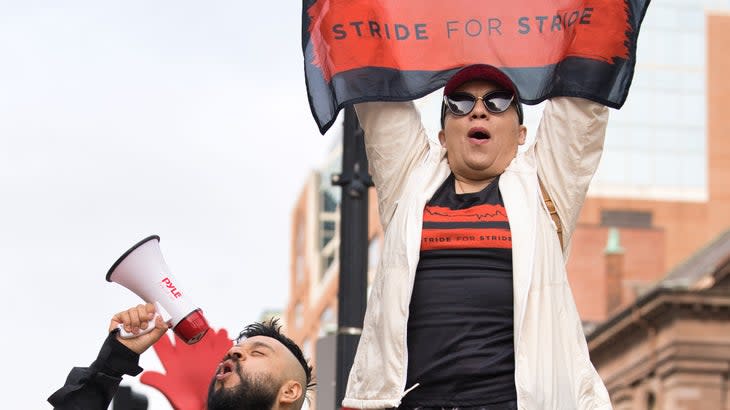
'We're Part of a Family'
In 2018, Estuardo Calel, a runner from Guatemala and an acquaintance of O'Keefe's from the Boston running scene, became the first Stride for Stride sponsored athlete. Calel shared news of the nonprofit with his friend and fellow runner, Jessica Colindres, also from Guatemala.
Colindres, a marathoner, preschool teacher, and mother of two, often couldn't attend her dream races due to the high cost of registration. After contacting O'Keefe, Colindres and her husband, Douglas, became the second and third sponsored athletes, and today, Colindres has completed 65 races, including 12 marathons and 24 half-marathons. Before joining the team, Colindres and her husband "might be able to buy one race bib, not two," she says. "Now, we run together more, we run in more races, and we feel more freedom. And we've made very close friends."
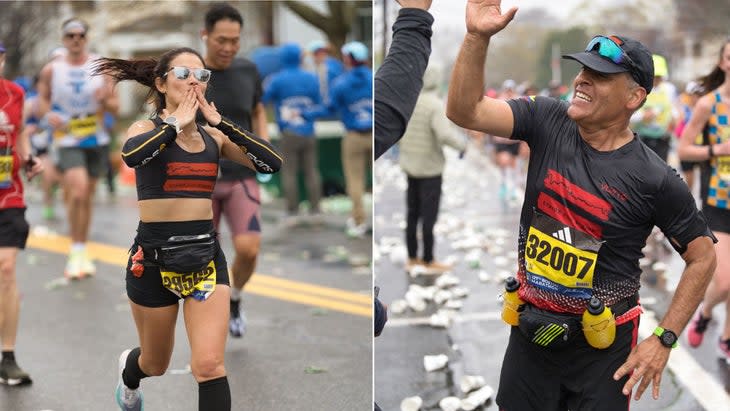
Today, Stride for Stride sponsors 368 runners from 26 countries and has spent $146,705 in bib purchases. The largest contingent of runners reside in Boston, although the team extends to New York City, Miami, and other cities in the U.S.
"There are runners on the team who I don't know personally, and yet somehow we still feel connected," says Karen Mejia, a Boston-based runner, social worker, and mother of two, originally from Honduras. Local runners will often host out-of-town teammates in their homes.
"When [teammates] come to Boston from New Jersey and New York, we feel like we're part of a family. We take care of each other."
RELATED: Running the Boston Marathon for the First Time
Over the past five years, O'Keefe has supported a growing roster of athletes through a combination of financial sources, the most lucrative being charity partnerships with the New York City Marathon and the Boston Marathon. Stride for Stride has also received grants from the Boston Athletic Association and REI (the latter of which "really helped us get through the pandemic," O'Keefe recounts). Individuals can donate online, and some organizations give race proceeds or free bibs to the nonprofit. O'Keefe built a structure positioned for growth, while the runners built something more akin to a family than a team.
"A lot of immigrants come to this country totally alone. They don't know anyone, and they don't speak the language," says O'Keefe. "I can't imagine how scary that must be." To find a community of people with "your passions, who speak your language, and who understand your struggles...It's beyond what I can understand."
Although he cannot fully understand the depth of these runners' bonds, O'Keefe is bound by them. He runs with the Boston-based athletes every week, races in his Stride for Stride singlet, participates in team traditions like the post-Falmouth bonfire, and commits his life and career to Stride for Stride. The nonprofit has become O'Keefe's full-time job, and the runners are his extended family. (In 2022, Calel asked O'Keefe and his wife, Bridget, to be godparents to his twins.)
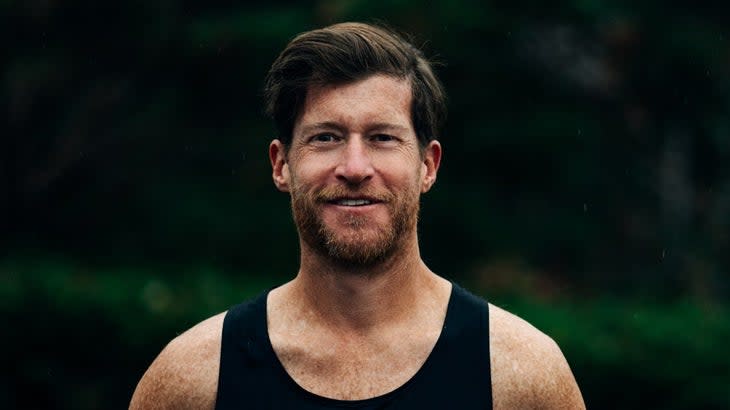
Finding a Match
In 2020, O'Keefe was diagnosed with chronic kidney disease (CKD). O'Keefe needed a kidney, or he'd have to go on dialysis, a treatment during which the average lifespan is 5 to 10 years. Soon, he had 10 percent kidney function, and was wrecked by fatigue--the main symptom of CKD--so severe that he'd sleep for two hours every afternoon and fall asleep by 9:30 P.M.
According to the National Kidney Foundation, 90 percent of people with kidney disease don't know they have it. Not everyone experiences the telltale sign, "proteinuria," or foamy urine. Plus, the main symptom of CKD is fatigue, easily attributed to other ailments. O'Keefe urges anyone with proteinuria, unusual fatigue, or other symptoms to get checked by their doctor.
When Boston-based Stride for Stride athlete, Jorge Rosales, heard that a family member was rejected as a donor and O'Keefe still needed a kidney, he called Tom immediately.
"I have one for you," said the 44-year-old father of three and car mechanic from El Salvador. Rosales contacted the hospital to begin the testing process. So did Colindres. Soon afterwards, Mejia did, too. For Rosales, the decision was a no-brainer. During the early months of the pandemic, he watched as O'Keefe launched another donation-based program, Heart to Cart, which purchases supermarket gift cards for families struggling to buy groceries.
"I saw everything Tom was doing to help people during the pandemic," says Rosales. "He was always worried about [Stride for Stride runners], asking us how we were doing. He's one of the kindest people I've ever met. I'd love to help with anything he needs."
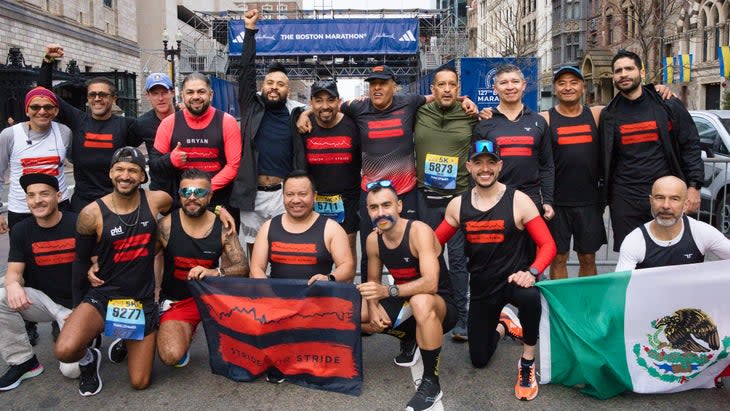
When reflecting on her decision to undergo the vetting process, Colindres expresses similar sentiments. "I cannot explain how I see Tom and [his wife], Bridget. There are no words." Colindres's voice quivers, and she looks up at the ceiling. She throws her hands in front of her face in a T-shape. Time out.
By August, 2023, Rosales had undergone five months of testing, including two MRIs, a CT scan, countless blood tests, and meetings with social workers to confirm his wish to donate. One last test would decide whether he was a match.
In early October, he received a call from the hospital: the final test result. Hands shaking, he called O'Keefe to deliver the news that would either save his life or make it markedly more difficult. The two padded their conversation in pleasantries--the weather, the miles run that morning, the races upcoming that fall--but eventually, Rosales's voice broke to a more serious tone: "The doctors called and I'm 100 percent compatible," he said. O'Keefe released a breath like a deflating balloon, heavy and forceful against his lips.
Action from Intention
According to a survey administered by the Running Industry Diversity Coalition (RIDC), 93 percent of running organizations express a commitment to diversity, equity, and inclusion, but only 70 percent of these organizations have DEI goals, 41 percent track their progress, and 14 percent publish their goals for the public. If this data provides any indication, far too many running organizations consider inclusion within the confines of an Instagram square or pithy marketing campaign.
Stride for Stride, however, is powerful because it rejects such a narrow approach. It also rejects the notion that DEI can be a bandwagon, that companies can hop on in 2020, then hop off when a trendier ride comes along. Stride for Stride serves as a reminder that efforts at inclusion must be seen, heard, and felt by the folks they seek to serve most directly. They must question norms and constantly strive for better.
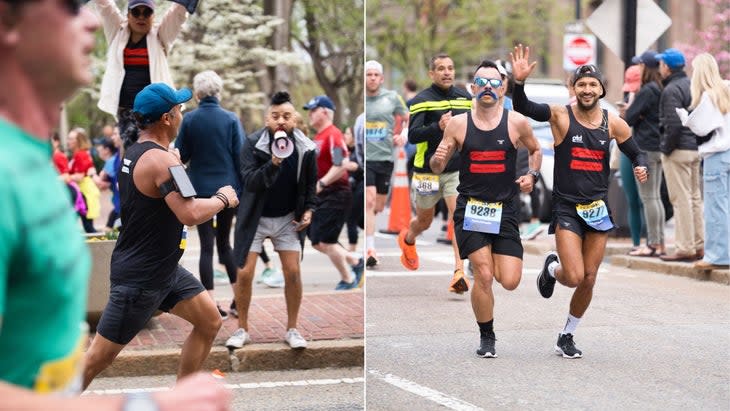
On Saturdays, the Boston-area Stride for Stride contingent gathers for a long run. Together, "we all speak Spanish; we speak at the same time," says Mejia. "So, I feel [bad] for Tom." (O'Keefe claims to not speak Spanish very well but plans to take more lessons while recovering from his transplant.)
"It's fine, it's totally fine," O'Keefe interjects, laughing. For their non-Spanish speaking teammate, runners seldom feel the need to translate. Which is to say, runners know that Stride for Stride belongs to them.
RELATED: Meet the People Making Running More Inclusive
Still, something else burgeons beneath Stride for Stride's intended outcomes--the languages spoken, bibs purchased, and charity dollars earned. There's a unique closeness that comes from pushing oneself to physical limits beside a teammate, falling so deep into the pain cave that one's labored breath becomes inseparable from the other's. Such bonds are often intrinsic to the culture of high school and college sports teams, but can too often be lost after adulthood. Stride for Stride reminds of one of the simplest elements of the sport, the "I’d give a kidney" sort of bond running can create.
In early January 2024, both O'Keefe and Rosales are set to undergo surgery--Rosales to lose a kidney, and O'Keefe to gain one. When asked how he is feeling, Rosales breaks into a wide grin.
"I'm excited!" he exclaims. As Rosales speaks over Zoom, he sits at home in Boston, a picture of himself, his wife, and their three kids on the wall behind him. Below the frame lies a cursive scrawl that spells "family," a word that spans far beyond the five people in the photo, thanks to Stride for Stride.
"[Rosales] keeps saying he's excited, which shocks me," O'Keefe says. "He's doing this amazing thing, taking an organ out of his body, and he's excited?!"
Once the two recover, O'Keefe and Rosales both plan to race a marathon, side-by-side, Rosales's kidney filtering the very blood that pumps through his teammate's veins.
For exclusive access to all of our fitness, gear, adventure, and travel stories, plus discounts on trips, events, and gear, sign up for Outside+ today.

